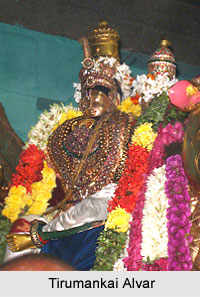 Tirumankai Alvar or Thirumangai Alvar, also known as Thirumangai Mannan, is an 8th century AD Vaishnava poet saint the last of the 12 Alvar saints of south India, who are known for their association to Vaishnava tradition of Hinduism. He is considered as the most superior and learned Alvar in terms of composition of verses. Tirumankai Alvar is also identified as Parakala, meaning beyond time therefore enlightened; and also as Narkavi Perumal, meaning the mark of an excellent poet.
Tirumankai Alvar or Thirumangai Alvar, also known as Thirumangai Mannan, is an 8th century AD Vaishnava poet saint the last of the 12 Alvar saints of south India, who are known for their association to Vaishnava tradition of Hinduism. He is considered as the most superior and learned Alvar in terms of composition of verses. Tirumankai Alvar is also identified as Parakala, meaning beyond time therefore enlightened; and also as Narkavi Perumal, meaning the mark of an excellent poet.
In his early life, Tirumankai Alvar used to be a chieftain, a military commander, as well as a robber, before becoming a much venerated Vaishnava poet saint. After he converted himself to Vaishnavism, Tirumankai Alvar confronted followers of Shaivism, rival Hindu sect and also practitioners of Jainism and Buddhism. Tirumankai Alvar is believed to have existed during the year 399 of Kali Yuga that is 2702 BC, which makes him the last Alvar saint. According to available historical evidences, contemporary scholars` believe he existed between 5th century and 9th century.
Early Life of Tirumankai Alvar
Tirumankai Alvar was born as Kalikanti (Kaliyan) in the small village of Thirukuraiyalur in Tamil Nadu in a non-Brahmin tribal family. His father, Nilam, was a general under the Chola Empire. Tirumankai also worked as a military commander for the Chola king and proved his efficiency in archery. He was bestowed with the title Parakala in recognition of his courage and for his military services, Tirumankai was presented small territory named Ali Nadu, to govern. The capital of the region was Thirumangai. He was also addressed as Thirumangai Mannan, meaning the chief of Thirumangai.
Tirumankai Alvar as a Vaishnava Saint
According to legends, Tirumankai Alvar was married to Kumudavalli, who was the adopted daughter of a Vaishnava doctor. His wedding was conducted in Thiruvellakkulam (Annan Kovil). Later, under the influence of his wife, Tirumankai became a Vaishnava, devotee of Lord Vishnu. Moreover, due to a promise made to his wife, Tirumankai vowed to feed 1008 Vaishnavas every day for a year. But due to heavy financial burden, he resorted to robbery. Eventually he encountered goddess Lakshmi and Lord Vishnu and renounced his sinful ways and converted into a devout Vaishnava and dedicated his life to Lord Vishnu.
Tirumankai Alvar as a Poet
Later, he travelled to 88 Divya Desams, which were a group of 108 shrines of Vishnu mainly in southern India. During his wandering, he propagated the poems of earlier Alvars. Tirumankai Alvar also wrote the verses of Periya Tirumoli, composition of hymns; and the initial 10 verses describe his conversion after attaining spiritual knowledge from the Lord. He composed 6 poems in Tamil and a total of 1361 verses. In the book Divya Prabandham, Tirumankai`s 1361 verses of are incorporated. Tamil Vaishnavas regard them as the 6 Tamil Angas or Vedangas of the 4 poems of Nammalvar that are considered as Vedas. The most significant work of Tirumankai Alvar is Periya Tirumoli, which comprises of 1084 hymns. The other devotional works of Tirumankai are Tirukuruthandakam (20 verses), Periya Tirumadal (297 lines), Tirunedunthandakam (30 verses), Siriya Tirumadal (155 lines) and Tiruvelukkutirukkai (47 lines).
Religious Significance of Tirumankai Alvar
In reverence to Tirumankai Alvar, the Thirumangai Alvar Mangalasasana Utsavam is held in the Tamil month of Thai. Along with idols from the 11 Thirunaangur Divyadesam shrines and idol of Tirumankai Alvar is also brought here on a Hamsa Vahanam.













